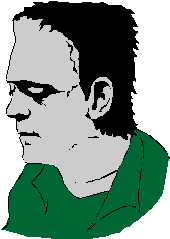
Hollywood did not give birth to Frankenstein; Mary Shelley did. More than a century before actor Boris Karloff, helped by make-up artists, made the monster in his image, came Shelley and her creation.
In the summer of 1816, nineteen-year-old Mary Wollstonecraft Godwin and her lover, the poet Percy Shelley, visited the poet Lord Byron at his villa beside Lake Geneva in Switzerland. Stormy weather frequently forced them indoors, where they and Byron's other guests sometimes read from a volume of ghost stories. One evening, Byron challenged his guests to each write one themselves. Mary's story, inspired by a dream, became Frankenstein.
Mary Shelley gave her monster feelings and intelligence. Fatherless and motherless, the monster struggles to find his place in human society, struggles with the most fundamental questions of identity and personal history. Alone, he learns to speak, to read, and to ponder "his accursed origins." All the while, he suffers from the loneliness of never seeing anyone resembling himself.
The reshaping of Mary Shelley's story began almost from the moment it first appeared. In 1823 Mary Shelley's father told her of an English Opera House production of a play entitled Presumption; or, The Fate of Frankenstein. Though inspired by her novel, the play departed from it freely. Shelley's original novel, memorable for its story and ambitious in the large questions it poses, has invariably been simplified and distorted, sometimes almost beyond recognition.
In 1930, Universal bought film rights to Peggy Webling's Frankenstein: An Adventure in the Macabre, which had premiered in London three years earlier. An obscure English actor, William Henry Pratt, who went by the stage name of Boris Karloff, played the monster in Universal's adaptation of the Webling play. . The 1931 Universal Studios production of Frankenstein, starring Boris Karloff as the monster, capped more than a century of variant tellings of the original story. Compared to Shelley's sensitive, articulate creature, Universal's was crude and unformed. But the sheer power of Hollywood image-making gave him an impact as great or greater than Shelley's, and made him into an icon of popular culture.
Karloff's success in Frankenstein made him a star. The film itself became an almost instant classic of a new genre--the horror movie. Frankenstein earned rave reviews, was named to top-ten lists, and made lots of money; the production cost $290,000 in Depression-era dollars, and earned more than $12 million
 Frankenstein books and movies
Frankenstein books and movies